英语U5语法(9年级)
人教版 英语九年级 Unit5 重要知识归纳
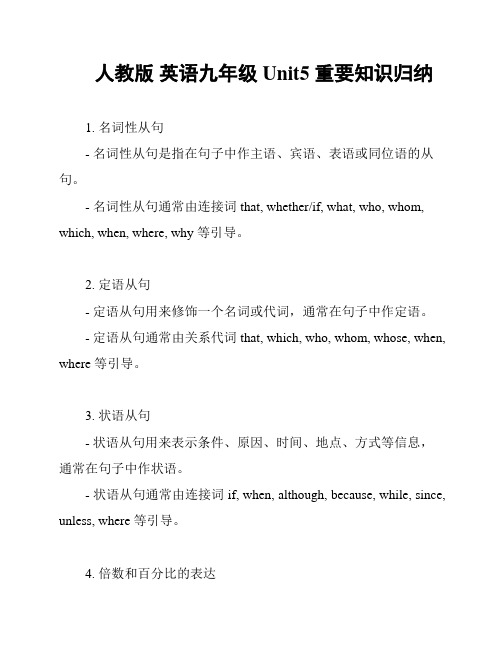
人教版英语九年级 Unit5 重要知识归纳
1. 名词性从句
- 名词性从句是指在句子中作主语、宾语、表语或同位语的从句。
- 名词性从句通常由连接词 that, whether/if, what, who, whom, which, when, where, why 等引导。
2. 定语从句
- 定语从句用来修饰一个名词或代词,通常在句子中作定语。
- 定语从句通常由关系代词 that, which, who, whom, whose, when, where 等引导。
3. 状语从句
- 状语从句用来表示条件、原因、时间、地点、方式等信息,
通常在句子中作状语。
- 状语从句通常由连接词 if, when, although, because, while, since, unless, where 等引导。
4. 倍数和百分比的表达
- 倍数表示方法:数字 + times
- 例如:two times, three times, etc.
- 百分比表示方法:数字 + 百分号
- 例如:10%, 25%, etc.
5. 句型转换
- 陈述句转换为疑问句:将句子的语序改为陈述疑问句语序。
- 一般疑问句转换为特殊疑问句:将疑问词放在句首,其余部分保持不变。
6. 词组和表达
- 一些常用的词组和表达:
- set up: 建立
- keep in touch: 保持联系
- on time: 准时
- look forward to: 期待
- take part in: 参加
以上是人教版英语九年级 Unit5 重要知识的归纳。
希望对你的学习有所帮助!。
人教版 英语九年级 Unit5 知识点整理

人教版英语九年级 Unit5 知识点整理1.本单元主要研究了以下几个知识点:宾语从句:宾语从句是一个完整的句子,作为主句的宾语。
它通常由连接词that。
whether。
if等引导。
例如:I ___ that he is a good student.动词不定式:动词不定式由to和动词原形构成,可以作为主语、宾语、表语和宾补等。
例如:To learn English well is my goal.形容词和副词比较级:形容词和副词的比较级用来表示两者之间的程度差异,形容词比较级通常在词尾加-er,也有不规则变化形式。
例如:This book is more interesting than the one I read before.特殊疑问词:特殊疑问词用来引导特殊疑问句,包括:what。
where。
when。
why。
who。
whom。
which。
how等。
例如:What is your favorite color?定语从句:定语从句是由关系代词或关系副词引导的从句,用来修饰一个名词或代词。
例如:The book that you lent me is very interesting.2.需要注意的几个语法点:不定式作主语时,动词不定式的逻辑主语是动词原形后面的动作的承受者。
例如:___.副词比较级的构成规则:形容词/副词比较级 + than + 原级 + [其他成分]。
例如:___.特殊疑问词的使用需要根据不同的情况进行选择。
例如:Where do you live?(询问地点)以上是本单元的知识点整理,希望对你的研究有所帮助。
初中英语人教版九年级 Unit 5 基础知识

Unit 5 基础知识短语section A1.be made of 由..制成(看出原材料)2.be made from 由..制成(看不出原材料)3.Be made by sb 由某人制成4.make up 编造,化妆,构成,弥补5.environmental protection 环境保护6.Protect the environment 保护环境7.Be famous for 因为..而出名8.Be famous as 作为..而出名9.Be widely known for 因为..而广为人知10.As far as I know 据我所知11.By hand 手工12.Find it +adj to do sth 发现做某事是...13.Avoid doing sth 避免做某事14.Allow doing sth 允许做某事15.Allow sb to do sth 允许某人做某事16.Sb be allowed to do sth 某人被允许做某事17.be covered by 由..覆盖短语section B1.find out 查明弄清楚2.Be held in 在某地被举办3.Turn ..into 把..变成4.According to 根据5.Be used to do 被用于做某事6.Be used for sth 被用于某事7.Be seen/regarded as 被视为..8.At a very high heat 以高温重点表达1...is widely known for ..China is widely known for long history and great traditional culture.2.it is + adj + thatIt is great that China has made great progress in technology.作文表达--the introduction of a traditional art form短语1.Be made of 由..制成2.Be used during (the Spring Festival) 被用于..节日3.Be used to show wishes for good luck.被用于表达好运的美好愿望4.be seen as symbols of happiness and love 被视为快乐和爱的象征句型1.Paper cutting is one of traditional art forms with long history in China.剪纸是中国历史悠久的传统艺术品之一2.It is mainly made of red paper.主要是红纸构成3.The most common pictures are flowers and animals.4.They are put on the walls, doors and windows during the Spring Festival.他们在春节期间贴在墙上,门上和窗上。
九年级unit5基础知识点
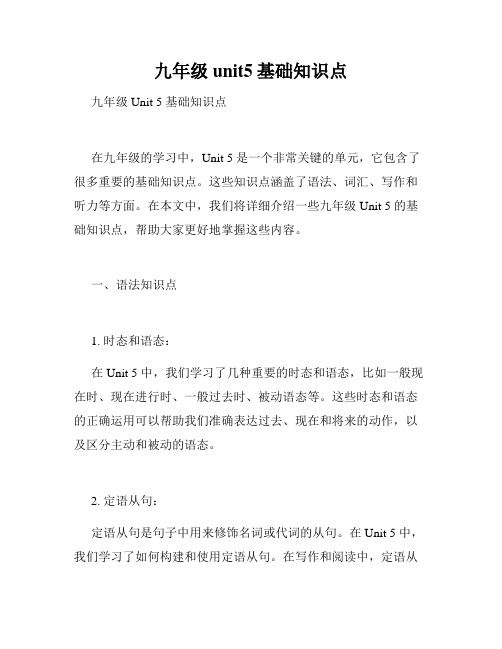
九年级unit5基础知识点九年级 Unit 5 基础知识点在九年级的学习中,Unit 5 是一个非常关键的单元,它包含了很多重要的基础知识点。
这些知识点涵盖了语法、词汇、写作和听力等方面。
在本文中,我们将详细介绍一些九年级 Unit 5 的基础知识点,帮助大家更好地掌握这些内容。
一、语法知识点1. 时态和语态:在 Unit 5 中,我们学习了几种重要的时态和语态,比如一般现在时、现在进行时、一般过去时、被动语态等。
这些时态和语态的正确运用可以帮助我们准确表达过去、现在和将来的动作,以及区分主动和被动的语态。
2. 定语从句:定语从句是句子中用来修饰名词或代词的从句。
在 Unit 5 中,我们学习了如何构建和使用定语从句。
在写作和阅读中,定语从句可以帮助我们更精确地描述事物,并且让句子更加丰富和有层次感。
3. 状语从句:状语从句是句子中用来表示时间、原因、条件、目的、结果等的从句。
在Unit 5 中,我们学习了如何使用不同类型的状语从句。
状语从句的运用可以帮助我们更准确地表达自己的意思,并且让语言更具连贯性和流畅性。
二、词汇知识点1. 单词拼写:在 Unit 5 中,我们学习了很多新的单词,并且需要掌握它们的正确拼写。
拼写正确的单词可以让我们的写作更加规范和地道,同时也提高了我们的阅读理解能力。
2. 同义词和反义词:在 Unit 5 中,我们也学习了一些同义词和反义词。
通过学习这些词语,我们可以扩展自己的词汇量,并且在写作和阅读中更加丰富我们的表达。
三、写作知识点1. 句型多样化:在写作中,我们需要尽量避免使用重复的句型,而是要多样化地表达自己的意思。
在 Unit 5 中,我们学习了一些新的句型和表达方式,可以帮助我们更好地组织和呈现自己的观点。
2. 写作连贯性:写作时,我们需要注意句子之间的连贯性。
通过使用适当的过渡词和连接词,我们可以使句子更流畅,段落更有逻辑性。
在Unit 5 中,我们学习了一些常用的连接词,比如however、therefore、in addition等。
九年级Unit5重点短语和句型

Unit5现在完成时⑴由have/ has +V P.P.(动词的过去分词)⑵表示过去发生或已经完成的某一动作对现在造成的影响或结果常与already, just , yet , ever, never 等连用Have you finished your work yet?Yes, I have. I have just finished it.I have already finished it .Have you ever been to China?No, I have never been there.⑶①表示过去已经开始,持续到现在的动作或状态和表示过去某一时刻延续到现在(包括现在在内)的一段时间的状态连用如:(for + 时间段,since + 时间点,或过去某一动作,以及how long )②注:非延续性动词在现在完成时态中不能和for, since引导的表示一段时间的状语的肯定句连用。
应转为相应的延续性动词如:buy—have die—be dead join—be in borrow—keep leave—be awayI have bought a pen. I have had a pen for 2 weeks.The dog has been dead since last week.⑷①have (has) been to + 地点去过某地已经回来②have (has) gone to + 地点去了某地没有回来③have been in + 地点一直呆在某地没有离开过如:She has been to Shanghai. 她去过上海。
(已经回来)She has gone to Shanghai. 她去了上海。
(没有回来)She has been in Shanghai for 2 days.她呆上海两天了。
(没有离开过上海)1.情态动词must, may , might, could, may , can’t表示推测含义与用法后面都接动词原形,都可以表示对现在情况的揣测和推断但他们含义有所不同)(20%-80%的可能性))The dictionary must be mine. It has my name on it.The CD might/could/may belong to Tony because he likes listening to pop music.The hair band can’t be Bob’s. After all, he is a boy!2. whose 谁的后面接名词如:Whose book is this? This is Lily’s.3. belong to 属于如:That English book belongs to me.4. 当play 指弹奏乐器时,常在乐器前用定冠词如:play the guitar play the piano当play 指进行球类运动时,则不用定冠词如:play football play basketball 5. if引导条件状语从句,主句用一般将来时,从句用一般现在时代替将来时(主将从现)如:If you don’t hurry up, you’ll be late.如果你不快点,你将会迟到。
人教版九年级英语unit5语法知识点
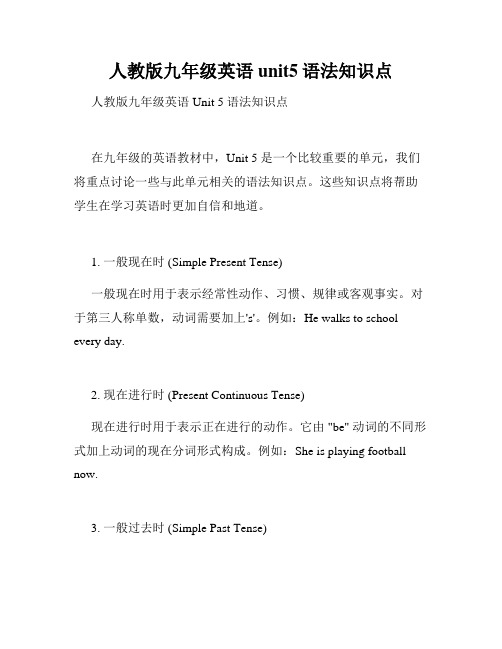
人教版九年级英语unit5语法知识点人教版九年级英语Unit 5 语法知识点在九年级的英语教材中,Unit 5 是一个比较重要的单元,我们将重点讨论一些与此单元相关的语法知识点。
这些知识点将帮助学生在学习英语时更加自信和地道。
1. 一般现在时 (Simple Present Tense)一般现在时用于表示经常性动作、习惯、规律或客观事实。
对于第三人称单数,动词需要加上's'。
例如:He walks to school every day.2. 现在进行时 (Present Continuous Tense)现在进行时用于表示正在进行的动作。
它由 "be" 动词的不同形式加上动词的现在分词形式构成。
例如:She is playing football now.3. 一般过去时 (Simple Past Tense)一般过去时用于表示过去某个特定的时间发生的动作或状态。
动词需要用过去式。
例如:I watched a movie last night.4. 过去进行时 (Past Continuous Tense)过去进行时表示过去某一时刻正在进行的动作或状态。
它由"was/were" 动词的不同形式加上动词的现在分词形式构成。
例如:They were studying when I called.5. 一般将来时 (Simple Future Tense)一般将来时用于表示将来某个时间将要发生的动作或状态。
通常使用 "will" 或 "be going to" 加上动词原形来构成。
例如:Wewill have a meeting next week.6. 现在完成时 (Present Perfect Tense)现在完成时用于表示过去某个时间开始并一直延续到现在的动作或状态。
它由"have/has" 加上动词的过去分词形式构成。
九年级Unit5知识点复习

Unit5 What are the shirts made of ?一、语法点:一般现在时的被动语态(一)概念:英语中有两种语态:主动语态和被动语态。
主动语态的主语是动作的执行者,被动语态的主语是动作的承受者。
(二)构成:A + is/am/are + V-过去分词+ by B(三)被动语态的句型结构:These dishes are washed by my mother. (一般疑问句)Are these dishes washed by my mother?These dishes are washed by my mother.(变否定句)The dishes aren’t washed by my mother.(四)某些含有被动关系的短语:have sth. done = get sth. done 让某事被做eg:I often have my hair cut.The boy got his ears pierced.(五)部分动词,如see、hear、watch、feel、notice等变被动语态时要注意还原不定式to,且被动语态中的动作执行者可省略eg: The boss makes us work 12 hours every day.(变被动语态)We are made to work 12 hours every day.(六)主动表达被动的情况①want/need/require doing = want/ need/ require to be done 需要被……My bike needs repairing. = My bike needs to be repaired.②look/sound/taste/smell等系动词用主动形式表示被动意义School uniform looks good on us.The dinner smells good.③open/lock/write/sell/read/cook等词作不及物动词且它们的主语为物时,可用主动语态表示被动意义This pen writes very smoothly.This book sells well.二、知识点1. glass①n. 玻璃(不可数名词)a piece of glass 一片玻璃②n. 玻璃杯(可数名词)eg: I broke a glass this morning.③n. 眼镜(可数名词,常用复数形式glasses)eg: Mr. Wang wears a pair of glasses.2. Is it made of silver?These wines are made from grapes.This kind of perfume is made in France.These orange peels can be made into medicine for sale.3. the art and science fair①fairn. 展览会;交易会eg: There will be a fashion fair this weekend.adj. 公平的,公正的be fair to sb.eg: We must be fair to both sides.②unfair adj. 不公平的eg: It’s unfair to treat the old man like that.4. grass and leaves.①leaf n. 叶;叶子(可数名词,复数形式为leaves)eg: There are some leaves in the picture.②以f或fe结尾的名词,其复数形式把f或fe变y再加es,常见的这类词有:wife—wives thief—thieves knife—knives life—lives half—halves self—selves5. China is famous for tea, right?Sun Li is famous as an actress. 孙俪作为演员出名。
人教版九年级全一册英语 Unit 5 重点语法知识点复习提纲

人教版九年级全一册英语Unit 5 重点语法知识点复习提纲Unit 5 What are the shirts made of?一、【精选单词】:balloon, blouse, cap, chopstick, coin, fork, form, glass, glove, grass, handbag, heat, leaf, material, product, scissors, steel, surface,avoid, complete, paint, process,international, lively, local,no matter, even though二、【词组归纳】1.be made of /from由……做成2.be made in在……制造3.at the art and science fair.在艺术科学交易会4.environmental protection .环境保护5. be famous for •=be well-known for.因……出名6. be widely known for广为所知7.in different areas在不同地区8. as far as I know据我所知9. on the sides of the mountains在山坡上10.be ready准备好11. be picked by hand被用手摘下12. be sent for processing被送去加工13. be packed被包装14. be sent to different countries被送去不同国家15. it seems that =Sth /sb.seems to do似乎16. all over the world全世界17.be good for对……有益18.people say=it is said that据说19. both in the past and now不但过去而且现在20. be produced in产于……(地方)21. buy sth. for +价格以多少钱买……22.a hundred percent cotton 100%棉(纯棉23. hear of= hear about.听说24.be invited to do被邀请去25. attend for free免费参加e up with creative ideas想出有创意的观点27.search for American products寻找美国产品28.go to another country去别的国家29.what kinds of things哪种东西30. no matter what =whatever不管什么31.find it interesting that(to do) 发觉……有趣32.so many products这么多产品33.in the local shops .在当地商店34. buy sth. for sb.=buy sb. sth. 为某人买某物35.even though即使,纵然36. American brands美国品牌37. a pair of一双38. avoid doing避免做……39. in fact实际上40. mobile phones手机41.everyday things日常用品42. in the future在将来43. high-technology products高科技产品44. in all parts of the world在世界所有地方45. shopping experience购物经历46.be allowed to do被允许去做47. be paid by被支付48. most of the earth’s surface大部分地球表面49. be covered by water被水覆盖50. cause many traffic accidents引起许多交通事故51.careless driving粗心驾驶52.find out .查明,弄清53.how to do .如何做54.all over the world全世界55. compete in kite flying •比赛放风筝56.know more about.更多理解57.the international kite festival.国际风筝节58.many different kinds of kites许多不同种类的风筝59.learn to fly a kite学放风筝60.be painted with colorful drawings.被画上鲜艳的图画61. special forms of traditional art传统艺术的特殊形式62. the most common things最普通的东西63. be turned into被变成64. objects of beauty美的东西65.according to .根据66.be first used by sb. 被……首次使用67.send out .发出68. ask for help.求助69.when in trouble当受困时70. be covered with被盖上71. slowly rise into the air慢慢升入空中72.symbols of happiness幸福的象征73. paper cutting剪纸74.be difficult/hard to do sth. 难做75.cut with scissors用剪子剪76. put on放在……上/穿上77. the clay pieces泥塑作品78.lively characters鲜活的人物79.Chinese fairy tale中国童话故事80.historical story历史故事81. be shaped by hand用手定型82. at a vey high heat/temperature以非常高的温度83. be polished and painted被打磨上色84.it takes sb. some time to do花费某人一些时间做……【精选句子】:1.Are your shirts made of cotton? Yes, they are. And they were made in the US.2.What’s the model plane made of? It’s made of used wood and glass.3.How is tea grown? It’s planted on the sides of mountains.【单元知识点】1. made of 由……制(构)成,后接构成某物质的原料。
九年级unit5笔记

九年级unit5笔记一、单词与短语enthusiastic:热情的,热心的devote:投入,奉献ambassador:大使doubt:怀疑custom:习惯,风俗awkward:尴尬的awkwardly:尴尬地occasion:场合tie:领带embarrassed:尴尬的二、句子结构与表达一般过去时态的用法:用于描述过去发生的事情。
例如:“Last week, we visited the Great Wall.”情态动词的用法:如“could”, “should”和“would”。
例如:“He said he could finish the task by tomorrow.”被动语态的用法:例如:“The book was written by him.”虚拟语气的用法:用于表示假设或与现实相反的情况。
例如:“If I were you, I would take the job.”定语从句的用法:例如:“The man who spoke at the meeting is my boss.”三、语法重点现在完成时的用法:表示过去发生的动作对现在有影响。
结构为“have/has + 过去分词”。
例如:“I have already finished my homework.”形容词的用法:描述名词的性质或状态。
例如:“She is beautiful.”副词的用法:描述动词、形容词或其他副词的性质或状态。
例如:“He runs quickly.”介词的用法:表示事物之间的关系。
例如:“I am interested in this project.”连词的用法:连接词与词、短语与短语、句子与句子。
例如:“Although he is young, he knows a lot.”四、作文练习写一篇关于一次难忘的经历的短文,描述事件发生的过程和你的感受。
使用现在完成时和一般过去时态描述。
(新版)人教版初中英语九年级全一册Unit5单词、重点语法

单词:chopsticks [?t??pstiks] n. 筷子.coin [k?in] n. 硬币fork [f?:k] n. 餐叉,叉子.blouse [blauz] n.(女士)短上衣;衬衫.sliver [silv?] n. 银,银器;adj.银色的 .glass [glas] n .玻璃cotton ['k?tn] ['kɑ:tn] n. 棉;棉花.steel [sti:l] n. 钢;钢铁.fair [fe?(r)] [fer] n.展览会;交易会 adj.公平的environmental [?n?va?r?n?mentl] adj.自然环境的;有关环境的 grass [ɡrɑ:s] [ɡr?s] n. 草;草地leaf [li:f] n.(pl. leaves [li:vz])叶,叶子 produce [pr?'dju:s] v. 生产;制造;出产 .widely [?waidli] adv. 广泛地;普遍地 .be known for 因……闻名;为人知晓 process [pr?uses] v. 加工;处理;过程.Park 包装;装箱 product [?pr?d?kt][?prɑ:d?kt] n. 产品;制品 France [fra:ns], [fr?ns] 法国 .no matter 不论;无论 .local [?l?ukl] adj. 当地的;本地的 .brand [br?nd] n. 品牌;牌子avoid [??v?id] v. 避免;回避 .handbag [?h?ndb?g] n. 小手提包 mobile [?m?ubail] adj.可移动的;非固定的 everyday ['evride?] adj. 每天的;日常的boss [b?s] [b?:s] n. 老板;上司 Germany [?d??:(r)m?ni] n. 德国 .surface [s?:(r)fis] n. 表面;表层.material [m??ti?ri?l] n. 材料;原料 .traffic [?tr?f?k] n. 交通;路上行驶的车辆 postman [?p?ustm?n] n. 邮递员 . cap [k?p] n(尤指有帽舌的)帽子 glove [gl?v] n(分手指的)手套 .international [?int?(r) ?n??n?l] adj. 国际的 competitor [k?m?petit?(r)] n. 参赛者;竞争者its [its] adj. 它的form [f?:(r)m] n. 形式;类型clay [klei] n. 黏土;陶土celebration [?sel??bre??n] n. 庆典;庆祝活动 balloon [b??lu:n] n. 气球 .paper cutting 剪纸 scissors [?siz?(r)z] n. (pl.) 剪刀lively [?laivli] adj. 生气勃勃的;(色彩)鲜艳的 fairy [?fe?ri] [?feri] tale [teil] n 童话故事 historical [h??st?r?kl] adj.(有关)历史的 heat [hi:t] n. 热;高温 v. 加热,变热 polish [?p?l??][?pɑ:l??] v. 磨光;修改;润色complete [k?m?pli:t] v. 完成Korea [k??ri:?] 朝鲜;韩国Switzerland [swits?(r)l?nd] 瑞士 San Francisco [?s?n fr?n?sisk?u] 圣弗朗西斯科(旧金山,美国城市) Marcus [?mɑ:k?s] n. 马库斯(男子名)Pam [p?m] 帕姆(女名) U n i t5知识梳理02Unit 5 What are the shirts made of?【重点短语】1.be made of 由...制成的(表示制成成品后,仍可看出原材料是什么)2.be made from 由...制成的(在成品中已无法辨认原材料)3.be known for 以......闻名4.be used for 被用于......5.no matter 不论;无论6.be covered with 用...覆盖7.as far as I know 据我所知8.by hand 用手9.be good for 对……有益10.on the last friday of each month最后一个星期五11.be good at 擅长12.make high-technology products 制造高科技产品13.the earth’s surface 地球表面14.many different kinds of 许多不同种类的15.fly a kite 放风筝16.such as 例如17.according to 根据按照18.ask for help 请求帮助19.a symbol of ……的象征20.put…on…把……放在……上21.be used for 被用于做……22.good luck 好运23.at a very high heat 在高温下24.be made in 在……制造的25.be famous for 以……著名26.on the sides of mountains 在山腰上27.traffic accident 交通事故28.a kite festival 风筝节29.be from 来自30.turn ……into ……把……变成……【重点句型】1. What are the shirts made of?衬衫是由什么制成的?2. It was made in Thailand.它是在泰国制造的。
九年级英语unit5知识点语法
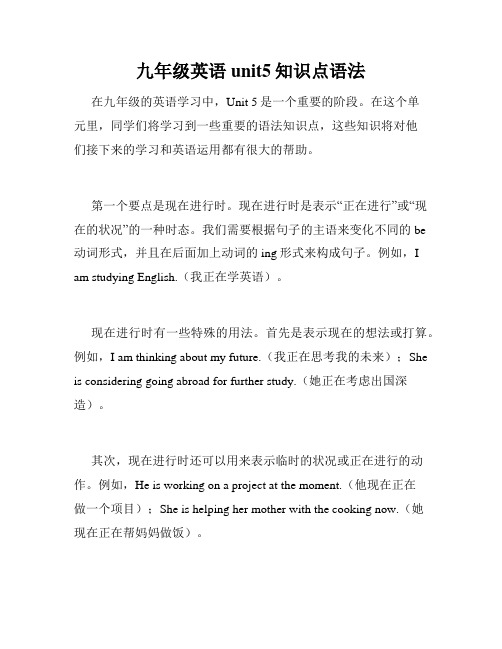
九年级英语unit5知识点语法在九年级的英语学习中,Unit 5是一个重要的阶段。
在这个单元里,同学们将学习到一些重要的语法知识点,这些知识将对他们接下来的学习和英语运用都有很大的帮助。
第一个要点是现在进行时。
现在进行时是表示“正在进行”或“现在的状况”的一种时态。
我们需要根据句子的主语来变化不同的be 动词形式,并且在后面加上动词的ing形式来构成句子。
例如,I am studying English.(我正在学英语)。
现在进行时有一些特殊的用法。
首先是表示现在的想法或打算。
例如,I am thinking about my future.(我正在思考我的未来);She is considering going abroad for further study.(她正在考虑出国深造)。
其次,现在进行时还可以用来表示临时的状况或正在进行的动作。
例如,He is working on a project at the moment.(他现在正在做一个项目);She is helping her mother with the cooking now.(她现在正在帮妈妈做饭)。
第二个要点是宾语从句。
宾语从句是一个句子,在复杂句中作为主句的宾语。
它通常由连接词that引导。
例如,He said that he would come to the party.(他说他会来参加聚会)。
宾语从句常常用在某些特定的动词后面,例如:advise, decide, find out, know, realize等等。
例如,She realized that she had left her keys at home.(她意识到她把钥匙忘在家里了)。
宾语从句还可以用来表示询问或疑问,例如:I don't know if he will come or not.(我不知道他会不会来)。
第三个要点是特殊疑问句。
九年级英语上册unit5知识要点_
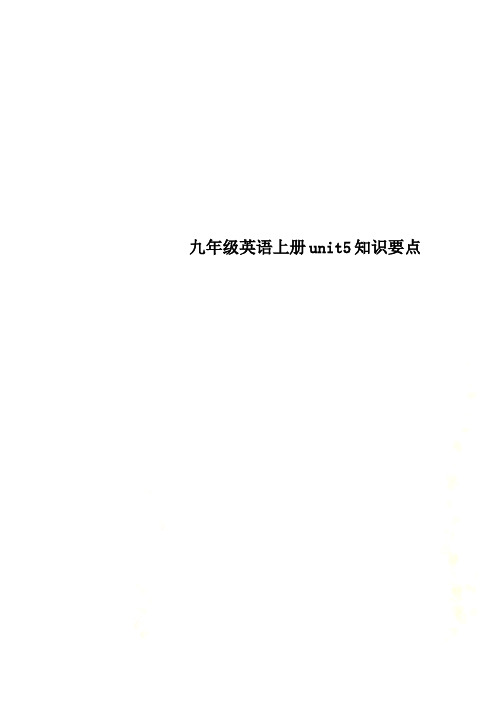
九年级英语上册unit5知识要点九年级英语上册Unit5 What are the shirts made of?一、语法被动语态(一)、什么是被动语态?英语中时态很多,但语态不多,只有两种,即:主动语态和被动语态。
所谓“被动语态”,相当于中文中常说的“被……”、“由……”的句式,如:“他的自行车被偷了。
”,“这座楼房是由他们建造的。
”(二)、被动语态的结构那么,英语中被动语态是怎么样构成的呢?请看下面的例句(注意划线部分):His bicycle was stolen.The building has been built for 20 years.通过上面的例句,可以看出,“被动语态”的构成是:be + 过去分词+ (by+动作执行者)(三)、被动语态的运用什么情况下要用被动语态呢?一般地说,有下面几种情况:1、不知道谁是动作的执行者或没有必要。
例如:Paper is made from wood. (纸是由木材生产出来的。
)The house is quite old. It was built in 1950. (这座房子太旧了。
它是1950年建成的。
) He was wounded in the fight. (他在战斗在受伤了。
)This book was published in 1981.这本书出版于1981年。
2、需要强调动作的对象时。
例如:Calculator can't be used in the maths exam.(计算器不能用于数学考试。
)Books and newspapers in the reading room must n’t be taken away. (阅览室的书籍和报纸不准带走。
)The window was broken by Mike.窗户是迈克打破的。
This book was written by him.这本书是他写的。
(四)、各种时态的被动语态举例一般地讲,被动语态可用于英语的各种时态。
人教版九年级全一册英语Unit5单元语法知识点总结

人教版九年级全一册英语Unit5单元语法知识点总结本单元重点短语的具体用法1. be made of:表示某物由某种材料制成,且制成后原材料仍可辨认。
例如:- This table is made of wood. 这张桌子是由木头制成的。
2. be made from:与“be made of”意思相近,但强调制成的物品已经看不出原材料。
例如:- Paper is made from wood. 纸是由木头制成的。
3. be known for:意为“因……而闻名”。
例如:- This city is known for its beautiful beaches. 这座城市以其美丽的海滩而闻名。
4. be used for:表示某物被用于某种目的。
例如:- This tool is used for cutting wood. 这个工具是用来砍木头的。
5. no matter:“不论;无论”,引导让步状语从句。
例如:- No matter what happens, I will always support you. 无论发生什么,我都会一直支持你。
6. be covered with:表示被某种东西覆盖。
例如:- The ground is covered with snow. 地面被雪覆盖了。
7. as far as I know:“据我所知”,常用在句首。
例如:- As far as I know, she is a very kind person. 据我所知,她是一个非常善良的人。
8. by hand:“用手”,强调手工制作。
例如:- These cookies were made by hand. 这些饼干是手工制作的。
9. be good for:“对……有益”,例如:- Exercising is good for your health. 锻炼对你的健康有好处。
10. on the last Friday of each month:“在每个月的最后一个星期五”,例如:- The meeting is always held on the last Friday of each month. 会议总是在每个月的最后一个星期五举行。
人教版九年级英语上册Unit 5 短语、句型及语法
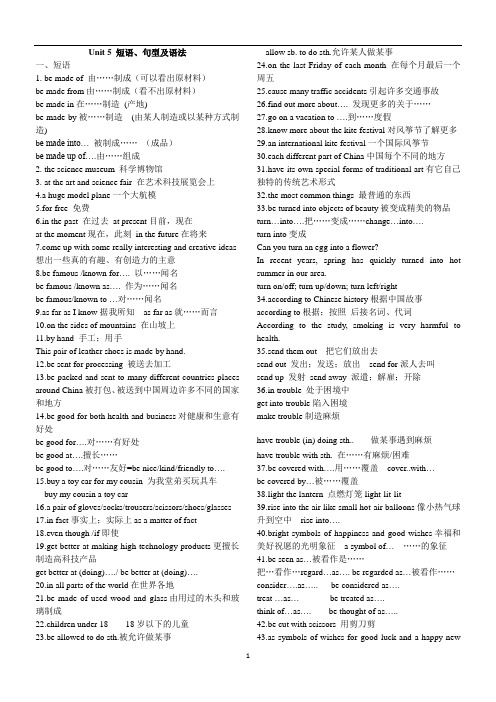
Unit 5 短语、句型及语法一、短语1. be made of 由……制成(可以看出原材料)be made from由……制成(看不出原材料)be made in在……制造(产地)be made by被……制造(由某人制造或以某种方式制造)b e made into…被制成……(成品)b e made up of….由……组成2. the science museum 科学博物馆3. at the art and science fair 在艺术科技展览会上4.a huge model plane一个大航模5.for free 免费6.in the past 在过去at present目前,现在at the moment现在,此刻in the future在将来e up with some really interesting and creative ideas 想出一些真的有趣、有创造力的主意8.be famous /known for…. 以……闻名be famous /known as…. 作为……闻名be famous/known to …对……闻名9.as far as I know据我所知as far as就……而言10.on the sides of mountains 在山坡上11.by hand 手工;用手This pair of leather shoes is made by hand.12.be sent for processing 被送去加工13.be packed and sent to many different countries places around China被打包、被送到中国周边许多不同的国家和地方14.be good for both health and business对健康和生意有好处be good for….对……有好处be good at….擅长……be good to….对……友好=be nice/kind/friendly to…. 15.buy a toy car for my cousin 为我堂弟买玩具车buy my cousin a toy car16.a pair of gloves/socks/trousers/scissors/shoes/glasses17.in fact事实上;实际上as a matter of fact18.even though /if即使19.get better at making high-technology products更擅长制造高科技产品get better at (doing)…./ be better at (doing)….20.in all parts of the world在世界各地21.be made of used wood and glass由用过的木头和玻璃制成22.children under 18 18岁以下的儿童23.be allowed to do sth.被允许做某事allow sb. to do sth.允许某人做某事24.on the last Friday of each month 在每个月最后一个周五25.cause many traffic accidents引起许多交通事故26.find out more about…. 发现更多的关于……27.go on a vacation to ….到……度假28.know more about the kite festival对风筝节了解更多29.an international kite festival一个国际风筝节30.each different part of China中国每个不同的地方31.have its own special forms of traditional art有它自己独特的传统艺术形式32.the most common things 最普通的东西33.be turned into objects of beauty被变成精美的物品turn…into….把……变成……change…into….turn into变成Can you turn an egg into a flower?In recent years, spring has quickly turned into hot summer in our area.turn on/off; turn up/down; turn left/right34.according to Chinese history根据中国故事according to根据;按照后接名词、代词According to the study, smoking is very harmful to health.35.send them out 把它们放出去send out 发出;发送;放出send for派人去叫send up 发射send away 派遣;解雇;开除36.in trouble 处于困境中get into trouble陷入困境make trouble制造麻烦have trouble (in) doing sth..做某事遇到麻烦have trouble with sth. 在……有麻烦/困难37.be covered with….用……覆盖cover..with…be covered by…被……覆盖38.light the lantern 点燃灯笼light-lit-lit39.rise into the air like small hot-air balloons像小热气球升到空中rise into….40.bright symbols of happiness and good wishes幸福和美好祝愿的光明象征 a symbol of………的象征41.be seen as…被看作是……把…看作…regard…as…. be regarded as…被看作……consider….as….. be considered as….treat …as…be treated as….think of…as…. be thought of as…..42.be cut with scissors 用剪刀剪43.as symbols of wishes for good luck and a happy new1year.作为祈求好运和新年快乐的象征44.look real 看上去逼真45. lively characters from a Chinese fairy tale or historical story来自中国童话故事或历史故事中的活灵活现的人物46.at a very high heat 以高温二、句型1.As far as I know, tea plants are grown on the sides of mountains据我所知,茶树种植在山坡上。
九上英语unit5知识点总结
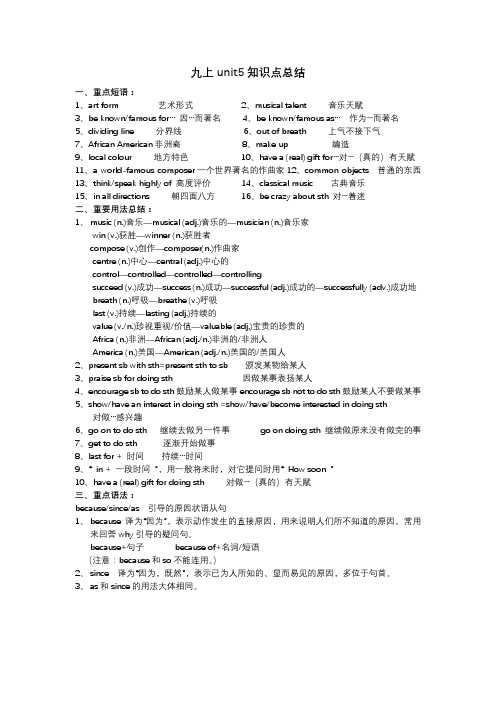
九上unit5知识点总结一、重点短语:1、art form 艺术形式2、musical talent 音乐天赋3、b e known/famous for… 因…而著名4、b e known/famous as…作为…而著名5、dividing line 分界线6、out of breath 上气不接下气7、African American非洲裔8、make up 编造9、local colour 地方特色10、have a (real) gift for…对…(真的)有天赋11、a world-famous composer一个世界著名的作曲家12、common objects 普通的东西13、think/speak highly of 高度评价14、classical music 古典音乐15、in all directions 朝四面八方16、be crazy about sth 对…着迷二、重要用法总结:1、music (n.)音乐—musical (adj.)音乐的—musician (n.)音乐家win (v.)获胜—winner (n.)获胜者compose (v.)创作—composer(n.)作曲家centre (n.)中心—central (adj.)中心的control—controlled—controlled—controllingsucceed (v.)成功—success (n.)成功—successful (adj.)成功的—successfully (adv.)成功地breath (n.)呼吸—breathe (v.)呼吸last (v.)持续—lasting (adj.)持续的value (v./n.)珍视重视/价值—valuable (adj,)宝贵的珍贵的Africa (n.)非洲—African (adj./n.)非洲的/非洲人America (n.)美国—American (adj./n.)美国的/美国人2、present sb with sth=present sth to sb 颁发某物给某人3、praise sb for doing sth 因做某事表扬某人4、encourage sb to do sth鼓励某人做某事encourage sb not to do sth鼓励某人不要做某事5、show/have an interest in doing sth =show/have/become interested in doing sth对做…感兴趣6、go on to do sth 继续去做另一件事go on doing sth 继续做原来没有做完的事7、get to do sth 逐渐开始做事8、last for + 时间持续…时间9、“in + 一段时间”,用一般将来时,对它提问时用“How soon ”10、have a (real) gift for doing sth 对做…(真的)有天赋三、重点语法:because/since/as 引导的原因状语从句1、because 译为“因为”,表示动作发生的直接原因,用来说明人们所不知道的原因。
人教版九年级全一册英语Unit5重点语法知识点总结
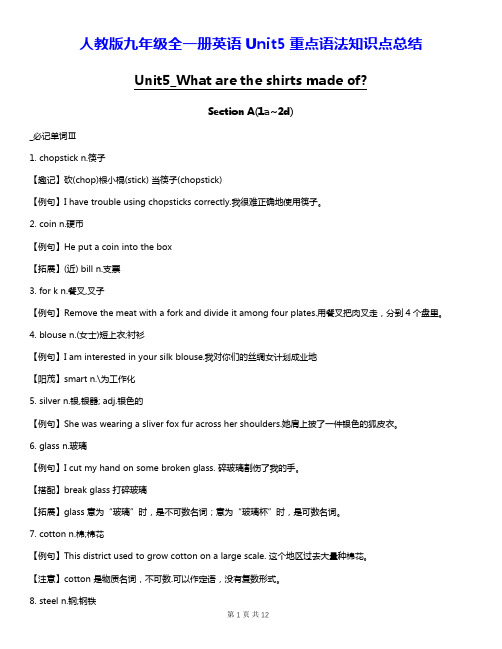
人教版九年级全一册英语Unit5重点语法知识点总结Unit5_What are the shirts made of?Section A(1a~2d)_必记单词Ⅲ1. chopstick n.筷子【趣记】砍(chop)根小棍(stick) 当筷子(chopstick)【例句】I have trouble using chopsticks correctly.我很难正确地使用筷子。
2. coin n.硬币【例句】He put a coin into the box【拓展】(近) bill n.支票3. for k n.餐叉,叉子【例句】Remove the meat with a fork and divide it among four plates.用餐叉把肉叉走,分到4个盘里。
4. blouse n.(女士)短上衣;衬衫【例句】I am interested in your silk blouse.我对你们的丝绸女计划成业地【阳茂】smart n.\为工作化5. silver n.银,银器; adj.银色的【例句】She was wearing a sliver fox fur across her shoulders.她肩上披了一件银色的狐皮衣。
6. glass n.玻璃【例句】I cut my hand on some broken glass. 碎玻璃割伤了我的手。
【搭配】break glass 打碎玻璃【拓展】glass 意为“玻璃”时,是不可数名词;意为“玻璃杯”时,是可数名词。
7. cotton n.棉;棉花【例句】This district used to grow cotton on a large scale. 这个地区过去大量种棉花。
【注意】cotton 是物质名词,不可数.可以作定语,没有复数形式。
8. steel n.钢;钢铁【例句】Hot steel is quenched to harden it.烧热的钢放入水中骤冷使之坚硬。
九年级英语全一册语法总结(Unit5)

第五单元的语法重点是:一般现在式的被动语态;现在完成时;名词所有格。
一般现在式的被动语态英语中有两种语态:主动语态和被动语态。
主动语态表示主语是动作的执行者。
被动语态表示主语是动作的承受者。
(1) 一般现在时的被动语态表示现阶段经常性、习惯性的被动动作,由“主语+ am/is/are +及物动词的过去分词(+by+动作执行者)”构成。
例如:The yard is cleaned (by someone) every morning.院子每天早上都有人打扫。
(2)当我们不知道谁是动作的执行者,或不用指出动作的执行者,而需要强调动作的承受者时,就要用被动语态。
例如:Mobile phones are mainly used to keep in touch with other people.手机主要被用来和其他人保持联系。
(3) 一般现在时的被动语态的一般疑问句是将be提至句首; 否定句是在be后加noto例如:Is Chinese spoken by many people?许多人说汉语吗?The little girl is not looked after by her mother.这个小女孩不是由她的妈妈照顾。
(4)主动句变被动句将主动句的宾语变为被动句的主语,将主动句的谓语变为被动结构(be+过去分词),将主动句的主语放在介词by之后作宾语,若为主格应改为宾格。
例如:He broke the cup.他打破了杯子。
f The cup was broken by him.杯子被他打破了。
直击中考1.【广西南宁】32. Han Han's books are popular. They by many teenagers.A. is readB. was readC. are readD. were read2.【湖北宜昌】34.-At present, one of the best ways to study is working in groups. -More chances to students to learn from each other.A. offerB. are offeredC. have offeredD. are offering现在完成时(1)由have/has+过去分词(2)表示过去发生或已经完成的某一动作对现在造成的影响或结果, 常与already, just, yet, ever, never 连用。
九年级英语unit5语法知识点

九年级英语unit5语法知识点九年级英语Unit 5语法知识点在九年级的英语中,语法知识点是学习的重点之一。
本文将介绍九年级英语Unit 5中一些重要的语法知识点,包括时态、被动语态、条件状语从句和直接引语与间接引语。
1. 时态时态是英语语法中一个非常重要的概念。
在Unit 5中,我们需要掌握的时态包括一般现在时、一般过去时、一般将来时和现在进行时。
一般现在时用于描述客观事实或经常发生的动作,如:I often go to the park on weekends. 一般过去时用于描述过去发生的动作或状态,如:She lived in Beijing when she was young. 一般将来时则用于表示将来发生的动作或事件,如:We will have a party next week. 现在进行时则用于表示现在正在进行的动作,如:He is studying for the exam.2. 被动语态被动语态是指动作的承受者出现在句子的主语位置,而动作的执行者则用by短语表示。
在Unit 5中,我们需要学习如何正确使用被动语态。
被动语态的构成是“be +过去分词”,例如:The book is written by Mark Twain. 被动语态尤其常用于科学实验和新闻报道中。
3. 条件状语从句条件状语从句是表达一个条件或假设的从句。
在Unit 5中,条件状语从句通常使用if引导。
它可以位于主句之前或之后,也可以分割成两个句子。
例如:If it rains, we will stay at home. 条件状语从句有时也可以使用其他引导词,如unless(除非)、as long as (只要)等。
4. 直接引语与间接引语直接引语是直接引述或抄录别人的原话,而间接引语则是将别人的原话转述成自己的话。
在Unit 5中,我们需要学会如何将直接引语转换为间接引语。
转换时需要根据情况改变人称、时态和时间状语等。
九年级英语unit5知识点讲解
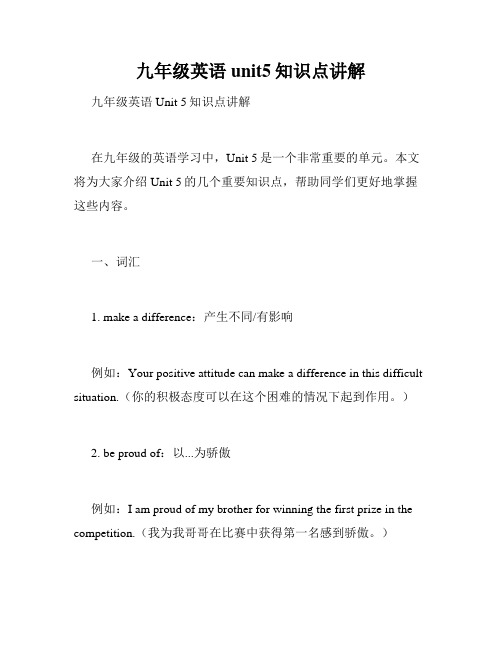
九年级英语unit5知识点讲解九年级英语Unit 5知识点讲解在九年级的英语学习中,Unit 5是一个非常重要的单元。
本文将为大家介绍Unit 5的几个重要知识点,帮助同学们更好地掌握这些内容。
一、词汇1. make a difference:产生不同/有影响例如:Your positive attitude can make a difference in this difficult situation.(你的积极态度可以在这个困难的情况下起到作用。
)2. be proud of:以...为骄傲例如:I am proud of my brother for winning the first prize in the competition.(我为我哥哥在比赛中获得第一名感到骄傲。
)3. take part in:参加例如:I want to take part in the school talent show.(我想参加学校的才艺表演。
)4. set goals:设定目标例如:In order to achieve success, it's important to set goals for yourself.(为了取得成功,设定目标对你很重要。
)5. achieve success:取得成功例如:With hard work and determination, I believe you can achieve success in whatever you do.(凭借努力和决心,我相信你无论做什么都能够取得成功。
)二、语法1. It is/was + 形容词 + to do sth.: 做某事是/感到某种感觉例如:It is interesting to learn a new language.(学习一门新语言很有趣。
)2. Would like to + 动词原形:想要做某事例如:I would like to travel around the world one day.(有一天我想环游世界。
- 1、下载文档前请自行甄别文档内容的完整性,平台不提供额外的编辑、内容补充、找答案等附加服务。
- 2、"仅部分预览"的文档,不可在线预览部分如存在完整性等问题,可反馈申请退款(可完整预览的文档不适用该条件!)。
- 3、如文档侵犯您的权益,请联系客服反馈,我们会尽快为您处理(人工客服工作时间:9:00-18:30)。
D. 上下文中
1.I received his letter yesterday morning. I hadn’t heard from him for a long time.
2. I saw him here at school just
now. He had disappeared since ten months ago.
What happened first?
The Past Perfect Tense
1. 基本形式:had + 过去分词 基本形式: (Past participle) eg. act be begin bring had acted had been had begun had brought
2. 否定形式:had + not + pp 否定形式: (had not照样可缩写 照样可缩写hadn't)。 照样可缩写 。 3. 一般疑问形式: 一般疑问形式: had提到句首, 提到句首, 提到句首 回答用Yes, 主语 + had. 回答用 No, 主语 + hadn‘t. We use “had” + pp for all persons.
3. By the time we arrived there,
the police hadn’t appeared.
B. 某些时间状语中
1.By 2005, we had learnt 2000 new words. 2.By the end of last month, we had received 3 letters from him.
When we got to the theatre, they had sold all the tickets.
过去的过去 had sold got to the theatre Now
过去完成时是一种与过去时 过去完成时是一种与过去时 相比较而存在的时态, 相比较而存在的时态,用以 表示“过去的过去” 表示“过去的过去”的动作 或状态。 或状态。
5. 常见的时间状语 从句)最佳搭档: 常见的时间状语(从句 最佳搭档 从句 最佳搭档:
过去完成时是个相对的时态, 过去完成时是个相对的时态,它 不能离开过去某时 动作而“ 不能离开过去某时 / 动作而“独闯天 动作, 下”,只能早于过去某时 / 动作,或 频频“光顾” 频频“光顾”于主句为一般过去时的 宾语从句中,所以 所以already / yet / still / 宾语从句中 所以 just / before / never / by (the end of ) last year 等时间状语常来“配合 等时间状语常来“ 作战” 也常活跃在after / before / 作战”;也常活跃在 when + 过去时态从句或 the time 过去时态从句或by 等的主句中。 + 过去时态从句等的主句中。 过去时态从句等的主句中
the film industry? Yes, she had put all her effort into ballet training before she entered the film industry?
What happened first?
2. What had Audrey been before she became a Hollywood superstar? She had been a model before she became a Hollywood superstar?
并列关系
2) 与一般过去时态“小同大异”:过 与一般过去时态“小同大异” 去完成时和一般过去时都可指动作发 生在过去, 生在过去,但过去完成时强调动作 于过去某一时刻已经完成; 相对于过去某一时刻已经完成;而一
般过去时则强调动作发生在过去某 或过去经常性、习惯性动作, 一时间或过去经常性、习惯性动作,
我去过那儿两次。 我去过那儿两次。 I have been there twice. _________ 在我上学前,我去过那儿两次。 在我上学前,我去过那儿两次。 had been I _________ there twice before I went to school.
Millie is chatting online with Sandy about a film she saw during the holiday. Complete their conversation. Use the correct forms of the verbs in brackets. (A4 on page 89)
C. 在told, said, knew, heard, thought
等动词后的宾语从句。 等动词后的宾语从句。
1.She said (that) she had never been to Paris before. 2.We thought they hadn’t arrived at the station yet.
Here are some questions for you to answer to see how much you have known about Audrey. Please answer them as quickly as you can.
The Past Perfect Tense 1. Had Audrey put all her effort into before she entered ballet training过去完成时
Unit 5 Grammar
(1)
Leading-in We have learned a lot about Audrey Hepburn. Can you finish the following fact sheet about her?
Name: Date of birth: Career: Films: Prizes:
需要特别注意的是: 需要特别注意的是:当动作附带 yesterday、last year等过去时间状语 、 等过去时间状语 应用一般过去时态。请区别: 时,应用一般过去时态。请区别:
到上个月底, 到上个月底,我们已经学了两首英文 歌曲。 歌曲。 had learned We ___________ two English songs by the end of last month.
A.状语从句中 状语从句中
在过去不同时间发生的两个动作中, 在过去不同时间发生的两个动作中, 发生在先,用过去完成时;发生在后, 发生在先,用过去完成时;发生在后 用一般过去时。 用一般过去时。
1.When the police arrived, the thieves had run away. 2.He had been an artist before he entered the film industry.
E. It was one’s first time that + 过去完成时
1.It was her first time that she had been to Shanghai. 2.It was my first time that I had taught teenagers English.
What happened first?
The Past Perfect Tense 4. How long had she had cancer by 过去完成时
the year she died? She had had cancer for about two years by the year she died.
Audrey Hepburn 4th May 1929 Actress Roman Holiday, Funny Face, Always, etc. An Oscar for Best Actress, Tony Awards, etc.
Date of death: 20th January 1993
6. 过去完成时与各大时态间的联系 与区别: 与区别: 1) 在书面表达中或正式场合里,如 在书面表达中或正式场合里, 描述的是过去某一连串持续性动作或 状态,用一般过去时利于理解。 状态,用一般过去时利于理解。
He came into the room,turned on the light and began to write.
6. I said I ____________ (have) lunch had had already. 7. She told us she ___________ (not be) hadn’t been to Beijing yet. had lived 8. I wondered if they __________ (live) in Nanjing for three years. had passed 9. Did you say I __________ (pass)the exam already? 10. He asked how many books I had read _________ (read) already?
had learned 1. We ‗‗‗‗‗‗‗‗‗‗‗‗‗‗‗‗‗‗‗‗‗‗‗ (learn) 3000 words by last term. Had 2. ‗‗‗‗‗‗‗‗‗ youlived ‗‗‗‗‗‗‗‗‗‗‗‗‗‗ (live) here for 20 years by 2004? h 3. They ‗‗‗‗‗‗‗‗‗‗‗‗‗‗‗‗‗‗ (work) for had worked 10 years by the end of last year. had taught 4. I ‗‗‗‗‗‗‗‗‗‗‗‗‗‗‗‗‗‗ (teach) you for two years by the end of last term.
